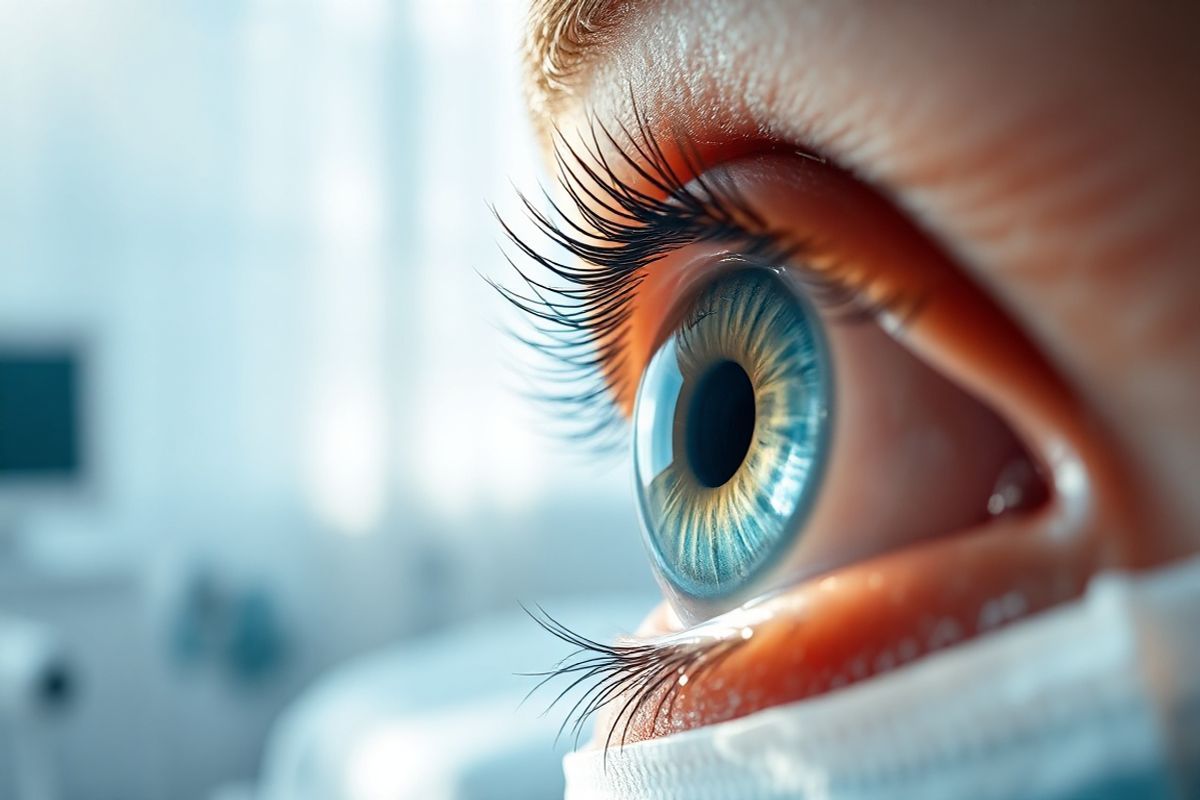Table of Contents
Understanding the Cataract Surgery Recovery Process

cataract surgery involves removing the cloudy lens of the eye and replacing it with an artificial intraocular lens (IOL). The surgery is typically performed on an outpatient basis and takes about 10 to 15 minutes. Patients can expect their vision to improve over a few days; however, complete recovery may take several weeks to months. During the first 24 hours after surgery, the incision made during the procedure begins to heal, but the underlying structures may take longer to recover. Most patients can return to their daily routines within a week, but some may experience temporary side effects like blurred vision, redness, or discomfort. It’s essential to follow your ophthalmologist’s instructions for a smooth recovery (American Academy of Ophthalmology, n.d.)[^1].
Recovery Timeline
The recovery timeline can be broken down into several key phases:
-
Immediate Post-operative Care (First 24-48 Hours): During this period, patients may wear a protective eye shield to safeguard the eye. It’s common to experience some discomfort and sensitivity to light. Vision might be variable, and patients must adhere strictly to prescribed medications.
-
First Week: Patients should continue using antibiotic and anti-inflammatory eye drops to prevent infection and reduce swelling. Activities should be limited to avoid straining the eye, and patients should refrain from wearing eye makeup during this time.
-
First Month: Gradual resumption of normal activities is encouraged, but patients should avoid swimming, hot tubs, and any activities that expose the eye to potential irritants. Regular follow-ups with the ophthalmologist are crucial to monitor healing progress.
Table 1 summarizes the key milestones in the recovery process:
| Time Post-Surgery | Expected Activities | Precautions |
|---|---|---|
| 24-48 Hours | Rest; wear protective eye shield | Avoid touching/rubbing the eye; do not drive |
| 1 Week | Resume light activities; reading, watching TV, using the computer | Avoid strenuous activities; continue eye drops |
| 1 Month | Gradually return to normal activities | No swimming; wear sunglasses outdoors |
Essential Eye Care Tips After Cataract Surgery
Proper eye care during the recovery phase is paramount for preventing complications and ensuring the best possible outcomes. Here are some essential tips:
-
Use Eye Drops as Prescribed: Patients will typically receive antibiotic and anti-inflammatory eye drops. It’s critical to use these as directed to prevent infection and reduce inflammation. Start using them the morning after surgery and continue until advised otherwise (NHS, n.d.)[^2].
-
Protect Your Eyes: Wearing a protective eye shield at night for at least a week helps prevent accidental rubbing or pressure on the eye. Sunglasses are recommended when outdoors to shield the eyes from dust, wind, and bright light.
-
Avoid Water Exposure: Patients should refrain from getting water, soap, or shampoo in their eyes for at least two weeks post-surgery. This includes avoiding swimming pools and hot tubs, which can harbor bacteria (Hopkins Medicine, n.d.)[^3].
-
Rest Adequately: Taking it easy for the first few days is essential. Avoid any activities that require heavy lifting or bending over, as these can increase eye pressure and interfere with the healing process (Discover Vision Centers, n.d.)[^4].
-
Maintain Hygiene: Wash hands thoroughly before administering eye drops or touching the face. Clean the eye gently with a sterile cotton ball dipped in boiled and cooled water to remove any discharge or stickiness.
Common Concerns and When to Seek Help
It is important to monitor for any unusual symptoms post-surgery. Patients should contact their ophthalmologist if they experience:
- Significant pain that is not relieved by over-the-counter pain medications
- Vision loss or sudden changes in vision
- Increased redness or swelling around the eye
- Flashes of light or dark curtains in vision
Gradually Resuming Activities: What You Need to Know

One of the most common questions after cataract surgery is about when to resume normal activities. Here’s a general guide:
-
Driving: Most patients can resume driving within 1-2 weeks after surgery, but only when their vision has stabilized and their surgeon has cleared them to do so (American Academy of Ophthalmology, n.d.)[^1].
-
Physical Activity: Light exercises, such as walking, can usually be resumed the day after surgery. However, high-impact activities should be avoided for at least a week to prevent complications (Cleveland Clinic, n.d.)[^5].
-
Work: The ability to return to work largely depends on the nature of the job. Office workers may return within a few days, while those in physically demanding jobs might require more time (NHS, n.d.)[^2].
-
Travel: Patients should consult their doctor before flying, especially within the first few weeks post-surgery. Air travel can increase pressure in the eyes, so clearance is essential.
The Importance of Follow-Up Appointments in Your Recovery Journey
Follow-up appointments are critical components of the recovery process. They allow your ophthalmologist to monitor the healing of the eye and address any complications early. Typically, follow-up visits occur:
- 1 day after surgery
- 1 week after surgery
- 1 month after surgery
During these appointments, the doctor will check visual acuity, assess the healing of the incision, and determine when it is safe to resume all normal activities. It’s crucial to attend all scheduled follow-ups and communicate any concerns or unusual symptoms during these visits (Vision Institute, n.d.)[^6].
Eye Exercises for Enhanced Recovery and Visual Acuity
In addition to proper care and follow-up, engaging in eye exercises can further support recovery and improve visual acuity. Here are some recommended exercises:
-
Focus Shifting: Hold a pen at arm’s length and focus on it. Gradually move it closer to your nose while maintaining focus, then move it back out. Repeat this exercise several times.
-
Palming: Rub your hands together to generate heat, then cup them over your closed eyes. This relaxes the eye muscles and can reduce strain.
-
Eye Rolling: Roll your eyes in a circular motion, first clockwise and then counterclockwise. This helps strengthen eye muscles and improves flexibility.
-
Near-Far Focus: Look at a nearby object (like a book) for 10 seconds, then shift your gaze to a distant object (like a tree outside). Repeat several times to enhance focus and depth perception.
These exercises can typically be started a week or two after surgery, but patients should confirm with their ophthalmologist that it is safe to begin them.
Frequently Asked Questions (FAQ)
How long does it take to fully recover from cataract surgery?
Most patients experience significant improvements in their vision within days, but full recovery can take up to six weeks or longer. It is normal for the vision to fluctuate during this period.
Can I watch TV or use a computer after surgery?
Yes, most patients can resume these activities within a few hours after surgery, though they may initially experience blurriness.
What should I do if I notice a return of cloudy vision after surgery?
Cloudy vision weeks or months post-surgery could indicate a condition known as posterior capsular opacification (PCO). Consult your ophthalmologist, as this can often be treated with a simple laser procedure.
Is it safe to wear glasses after cataract surgery?
You can wear your old glasses, even if they are not the correct prescription, but it’s best to wait for your vision to stabilize before getting a new prescription.
What are the risks of cataract surgery?
While cataract surgery is generally safe, risks include infection, bleeding, retinal detachment, and vision loss. Discuss these risks with your ophthalmologist before surgery.
References
- American Academy of Ophthalmology. (n.d.). Cataract Surgery: Risks, Recovery, Costs. Retrieved from https://www.aao.org/eye-health/diseases/what-is-cataract-surgery
- NHS. (n.d.). Cataract surgery - Recovery. Retrieved from https://www.nhs.uk/conditions/cataract-surgery/recovery/
- Hopkins Medicine. (n.d.). Cataract Surgery Recovery: 5 Tips From an Expert. Retrieved from https://www.hopkinsmedicine.org/health/wellness-and-prevention/cataract-surgery-recovery-5-tips-from-an-expert
- Discover Vision Centers. (n.d.). How Long Does It Take to Recover from Cataract Surgery? Retrieved from https://www.discovervision.com/blog/how-long-does-it-take-to-recover-from-cataract-surgery/
- Cleveland Clinic. (n.d.). Cataract Surgery: Recovery and How It Works. Retrieved from https://my.clevelandclinic.org/health/treatments/21472-cataract-surgery
- Vision Institute. (n.d.). Cataract Surgery Recovery Timeline. Retrieved from https://www.vision-institute.com/recovery-timeline-after-cataract-surgery-what-to-expect/











